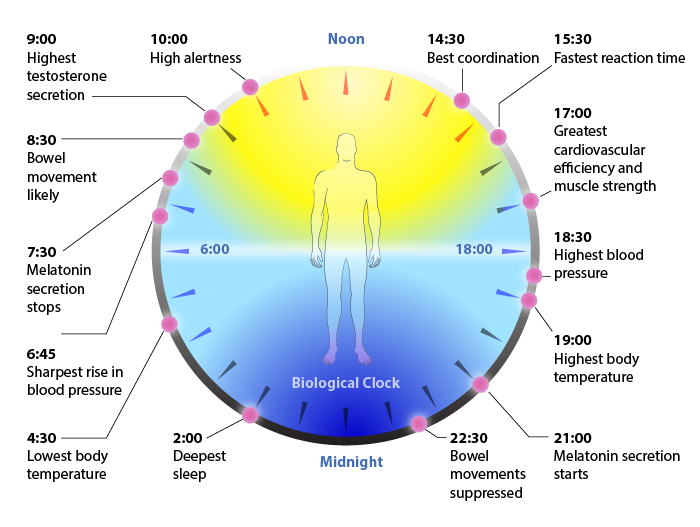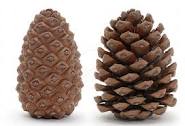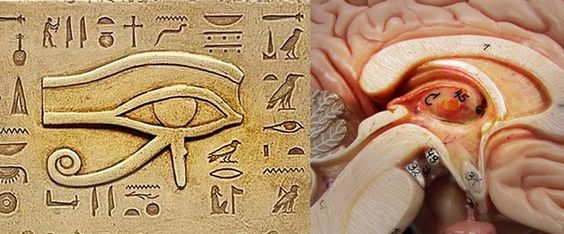 Melatonin is a hormone secreted by the pineal gland in the brain. It helps regulate other hormones and maintains the body’s circadian rhythm. The circadian rhythm is your internal 24-hour “clock” that plays a critical role in when you fall asleep and when you wake up. When it is dark, your body produces more melatonin. When it is light, the production of melatonin stops. Being exposed to bright lights in the evening, or too little light during the day, can disrupt the body’s normal melatonin cycles, as can jet lag, shift work and poor vision.
Melatonin is a hormone secreted by the pineal gland in the brain. It helps regulate other hormones and maintains the body’s circadian rhythm. The circadian rhythm is your internal 24-hour “clock” that plays a critical role in when you fall asleep and when you wake up. When it is dark, your body produces more melatonin. When it is light, the production of melatonin stops. Being exposed to bright lights in the evening, or too little light during the day, can disrupt the body’s normal melatonin cycles, as can jet lag, shift work and poor vision.
Melatonin also helps control the timing and release of female reproductive hormones. It helps determine when a woman starts to menstruate, the frequency and duration of menstrual cycles, and when a woman stops menstruating (menopause). Preliminary research suggests low levels of melatonin help identify women at risk of a pregnancy complication called pre-eclampsia. Some researchers also believe that melatonin levels may be related to aging. For example, young children have the highest levels of night time melatonin. Researchers believe these levels drop as we age and some also think lower levels of melatonin may explain why some older adults have sleep problems and tend to go to bed and wake up earlier than when they were younger. This could also be one of the reasons why older people are prone to disease. It has also been stated that those who suffer from breast cancer, prostate cancer and autism have less than half the melatonin they should really have.
Melatonin has strong antioxidant effects and preliminary evidence suggests that it may help strengthen the immune system. It is also a free radical scavenger that helps ‘cool down’ excess inflammation. In fact, melatonin is so integral to the health of your immune system that a lack of it causes your thymus gland, a key component of your immune system, to shrink in size. Because melatonin is a strong antioxidant and is able to cross the blood-brain barrier, it is thought to help protect against Alzheimer’s disease as well as brain aging. It is also said to be five times more powerful than vitamin C and twice as powerful as vitamin E.
Melatonin’s immediate precursor is the neurotransmitter serotonin, which is a major player in regulating and giving a lift to your mood. Serotonin is the hormone that is responsible for the “feel good” factor and like serotonin, melatonin plays important roles in your physical and mental health. Studies have shown that insufficient melatonin production can set you up for decreased immune function, erratic blood pressure, increased plaque in the brain, as seen with Alzheimer’s disease, decreased scavenging of free radicals, increased risk of osteoporosis, diabetic capillary damage, depression and seasonal affective disorder (SAD) and the acceleration of tumour and cancer cell growth. Research has also shown that melatonin offers particularly strong protection against reproductive cancers. Cells throughout your body, even cancer cells, have melatonin receptors, indicating their ability to take in melatonin.
If you’re wondering how to ensure that you’re getting enough melatonin, supplementation may be beneficial but it is much better and certainly less expensive to have your body produce its own melatonin by getting adequate high quality sleep and the decalcification of your pineal gland, as this is the place where melanin is produced.. Small quantities of melatonin are also found in foods like Goji berries, almonds, sunflower seeds, coriander and cherries, but, again, when you optimize your own production you will get the “perfect” dose of melatonin for you. Iodine also removes fluoride and bromide from your pineal gland, so supplementing with kelp tablets or seaweed can help in this regard. Another way to do this is to improve your sleep hygiene, which will in turn help you optimize your melatonin production. For a comprehensive sleep guide avoid watching TV or using your computer in the evening, at least an hour or so before going to bed. These devices emit blue light, which tricks your brain into thinking it’s still daytime. Normally, your brain starts secreting melatonin between 9 pm and 10 pm, and these devices emit light that may stifle that process.
Below is a list, in no particular order, of eight supplements that will boost your melatonin production by increasing your pineal gland function, help in its decalcification, and support you on your journey of personal and spiritual cultivation.
Sleep in complete darkness, or as close to it as possible. Even the slightest bit of light in your bedroom can disrupt your biological clock and your pineal gland’s melatonin production. Even the tiniest glow from your clock radio could be interfering with your sleep, so cover your clock radio up at night or get rid of it altogether. Move all electrical devices at least three feet away from your bed. You may want to cover your windows with drapes or blackout shades, or wear an eye mask when you sleep. Not very romantic but it helps your melanin production. Install a low-wattage yellow, orange or red light bulb if you need a source of light for navigation at night. Light in these bandwidths does not shut down melatonin production in the way that white and blue bandwidth light does. Salt lamps are handy for this purpose.
Keep the temperature in your bedroom no higher than 70 degrees F. Many people keep their homes too warm (particularly their upstairs bedrooms). Studies show that the optimal room temperature for sleep is between 60 to 68 degrees F. Take a hot bath 90 to 120 minutes before bedtime, this increases your core body temperature, and when you get out of the bath it abruptly drops, telling your body that you are ready to sleep. Avoid using loud alarm clocks as being jolted awake each morning can be very stressful. If you are regularly getting enough sleep, you might not even need an alarm.
Get some sun in the morning, if possible. Your circadian system needs bright light to reset itself. Ten to 15 minutes of morning sunlight will send a strong message to your internal clock that day has arrived, making it less likely to be confused by weaker light signals during the night. More sunlight exposure is required as you age and remember also that it is the actual brightness and not the temperature that matters where melatonin is concerned, unlike the production of vitamin D which relies on the heated rays of sunshine. Make sure you get BRIGHT sun exposure regularly. Your pineal gland produces melatonin roughly in approximation to the contrast of bright sun exposure in the day and complete darkness at night. If you are in darkness all day long, it can’t appreciate the difference and will not optimize your melatonin production. The human eye contains photo-sensitive cells in the retina with connections direct to the brain and wearing sunglasses prevents ultraviolet rays from reaching the eyes and then the pineal gland. Regular use of aspirin also reduces the production of melatonin.
Electro-magnetic fields (EMFs) can disrupt your pineal gland and its melatonin production, and may have other negative biological effects as well (next month’s article). Nutrition experts will tell you that brightly coloured fruits and vegetables are the best sources of antioxidants but melatonin hormones are more powerful. This is interesting because western societies have had higher and higher rates of chronic illness and disease since the birth of the Industrial Revolution. While this may be due to symptoms of a deficiency in vitamin D from less sun exposure, massive exposure to environmental toxins, our high intake of processed foods and a million other causes- it could very well have to do with our constant exposure to electric lights at night, which causes a decrease in melatonin hormones, which means fewer antioxidants.
Melatonin levels have been shown to be decreased in almost every diseased state- from autism to autoimmune disease to premature puberty, it seems that low melatonin levels occur with disease. Whether the benefits of melatonin include reversing disease has not been studied well or answered conclusively- but it is interesting and is an excellent reason to keep your melatonin levels high by getting to sleep before 11.00 pm, by minimizing your exposure to electric lights after dark and by sleeping in pitch darkness
So melatonin is a hormone, an inducer into altered states of consciousness, an antioxidant and it is also a smooth muscle relaxant. Probably one of the least known things about melatonin is that it not only acts as a muscle relaxant on the smooth muscles- particularly those of the digestive tract but it is also made by cells of the digestive tract as well. Administration of melatonin has actually shown improvement in inflammatory bowel diseases such as irritable bowel syndrome, Crohn’s disease, the digestive problems that accompany autism and, gastro-esophageal reflux.
It makes you wonder if getting the proper sleep at the proper time to produce as much melatonin as possible could help people with digestive problems. One study linked poor sleep to worse gastrointestinal problems in irritable bowel syndrome (IBS) and it’s fairly well known that when melatonin is given to children with autism, their chronic digestive complaints improve. Many of us have been exposed to sodium fluoride due to fluoridation of our water systems, and this has also resulted in the calcification of the pineal gland. Iodine, naturally occurring in plants such as seaweed, effectively improves the removal of sodium fluoride via urine. Unfortunately, the Western diet has left us deficient in this vital mineral while our bodies need it most. To avoid calcium deficiency when taking iodine supplements, a diet incorporating many organic foods such as kale, broccoli, almonds, oranges, flax seed, sesame seeds, dill, thyme and other dried herbs is recommended. The pineal gland has been implicated in a number of disorders including cancer, sexual dysfunction, hypertension, epilepsy and Paget’s disease. The pineal gland calcifies with age and melatonin production correspondingly decreases. This decline in melatonin has been suggested to be a trigger for the aging process.
Environmental stresses affect pineal function, impacting overall body alertness, temperature levels, and hormone operation. Stresses that affect pineal function include unusual light and dark rhythms, radiation, magnetic fields, nutritional imbalances, temperature swings, high altitude, and overall daily stress patterns.
The pineal gland contains magnetic material in birds and other animals. It is a centre for navigation. This, of course, is important for blind individuals as well. Magnetic processing is subtle and may be part of the body’s unconscious navigational system. Mobility specialists are aware of this possibility. Scientists believe that the pineal gland is a magneto-receptor, capable of monitoring magnetic fields, and helping to align the body in space. This was demonstrated by changing the direction of magnetic fields around the heads of birds which altered their ability to navigate.
There are many foods that help decalcify and improve the function of the pineal gland, while detoxifying other parts of the body. These include: cilantro, tamarind, Goji berries, watermelon, bananas, honey, coconut oil, hemp seeds, seaweed, noni juice, garlic, Chaga mushroom, raw lemon juice. Pineal gland decalcification can also be gained by eating more alkalizing foods. RAW. Organic cocoa in its purest form can also help detoxify the pineal gland because of cacoa’s high antioxidant content. Supplements like spirulina, chlorella, wheatgrass and blue-green algae are examples of chlorophyll-rich superfoods that offer similar benefits to eating leafy greens but with much more nutrition packed into a small serving. These nutrient dense supplements assist in the decalcification of the pineal gland due to their strong detoxification properties.
According to a 2012 article published in Food and Nutrition Research, low levels of folate, magnesium and zinc may impair the production of melatonin. Filling your diet with foods rich in these nutrients may help make sure your pineal gland has what it needs to produce the important hormone. Spinach, beans and asparagus are good sources of folate . You can meet your magnesium needs by including nuts, beans, yogurt and potatoes in your diet. For zinc, oysters, crabs, and chickpeas can help you meet your daily needs for pineal health and melatonin production.
Both oregano oil and neem extract help in the purification process, helping to remove existing calcification within the pineal gland, in addition to purifying the body’s systems, especially the endocrine system. Neem has been used in this way in India for thousands of years. In the western world, oregano oil is also becoming a holistic way of fortifying the immune system. In the longer term, both of these supplements will act as a natural antibiotic against new calcium shells created by nano-bacteria.
For those of us who seek to fully activate our spiritual potential and tap into the power of the pineal gland, we must begin by strengthening its function through detoxification and proper nutrition. Researchers are finding that in many people, due to our poor diet, with pesticides, chemical-laden foods and environmental toxins such as fluoride in our water, the pineal gland and our entire bodies are exposed to many more toxins and nano-organisms than ever before. These form calcium shells around themselves for protection from our immune systems which has resulted in calcification of the pineal gland together with a build-up of calcium phosphate crystals in various parts of the human body. Many of us have a pineal gland that is already completely calcified. This does not fare well when we try to tap into the esoteric capabilities of this gland through yoga practice, meditation, using plant medicines and so forth. The process of detoxification is an essential place to start if we want to exploit our full spiritual capabilities which go hand in hand with having a disease free body.
Raw apple cider vinegar, which is a natural detoxifier helps decalcify the pineal gland due to its malic acid properties. Malic acid is an organic compound that gives fruits their sour taste. When taken as a supplement, it supports the digestive system and helps the body detoxify. Apple cider vinegar has many other health benefits. Ensure that the brand you buy is raw and cloudy which indicates that it is not refined and all the health giving properties removed. The reduction in melatonin production, as during aging, shift-work or illuminated environments during the night, induces insulin resistance, glucose intolerance, sleep disturbance, and metabolic circadian disorganization, causing a state of disruption leading to obesity.
When your circadian rhythms are properly regulated, you sleep well, you have energy in the mornings, your energy is constant throughout the day until it starts to gradually diminish in the evening and it reduces your risk of chronic disease. Yes, all chronic disease. The light-dark cycle mentioned above is the most important signal to your circadian clock. This means that one of the best ways to set your circadian clock is to be exposed to bright light (ideally sunlight) during the day, but be in the dark at night. In fact, sunlight exposure during the day is probably the single most important thing you can do to support the normal production of melatonin in the evening.
If you plan to use a computer monitor or watch TV, there are two options. The first is to install “f.lux” on your computer or android devices and set the screen brightness to the lowest setting. The second and probably the best thing for supporting evening melatonin production (more technically called dim-light melatonin production) is to wear amber- tinted glasses for the last 2-3 hours of your day. In fact, several scientific studies show that wearing amber-tinted glasses in the evening improves sleep quality and supports melatonin production. What are amber tinted glasses? Quite simple: glasses with yellow lenses. These could be driving glasses, glaucoma glasses, or safety glasses. Some people prefer the large lens of safety glasses because they also block peripheral light and there are also options that can fit well over regular glasses. Amber-tinted glasses are also a great option for shift workers. The idea here is to reduce the amount of “blue” light to which you are exposed in the run up to bedtime. This “daytime exposure” at night disrupts your hormones leading to disease. Eating tart cherries before bedtime has been shown to increase melatonin production and induce a good night’s sleep.
Disclaimer: The contents of this website are not intended to replace a one to one relationship with your health practitioner nor are they meant as medical advice. You are encouraged to do your own research and make your own decisions in partnership with your medical practitioner.
